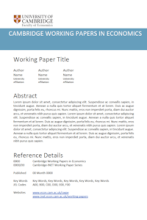This project examines key macro-distributional trends that appear to hold across many OECD economies over the past few decades: earnings inequality has risen due to greater wage differences between firms; the productivity gap between leading firms and laggards has widened; and high- and low-skill employees increasingly work in separate firms (see, among others, Andrews et al., 2019; Song et al., 2019; Criscuolo et al., 2020).
The project aims to provide a joint treatment of these economically and politically salient trends through the lens of team-based production (cf. Garicano, 2000). The central idea is that the secularly rising importance of human knowledge in production reinforces interdependencies between coworkers, as value creation in such an environment requires individuals to specialise and collaborate (Neffke, 2019; Jones, 2021). The resulting coworker interdependencies make it profitable for entrepreneurs to recruit 'superstar teams' composed of the most talented workers that pull away from 'the rest'. I am developing a theoretical model that formalises this idea and explicates its macroeconomic implications. To empirically discipline the microfoundations of this model, the project supplements administrative, matched employer-employee data with a proprietary network dataset that is informative at a very granular level about patterns of team composition and interaction in a multi-division, Fortune-100 company.
The envisioned research outputs would contribute to the goals of the Keynes Fund by providing insights into the sources of economic value and the origins of income disparities in modern economies.
Superstar Teams: The Micro Origins and Macro Implications of Coworker Complementarities
Superstar Teams: The Micro Origins and Macro Implications of Coworker Complementarities, Lukas B. Freund , Cambridge Working Papers in Economics (2022)
Modern production frequently involves teamwork among employees specialized in different tasks. I develop a model of teams in which firms assign tasks to workers who are heterogeneous in their overall quality and whose efficiency varies across different tasks. In addition to productivity gains, the division of labor generates coworker complementarities: the marginal productivity of one employee’s quality is increasing in other team members’ quality. This interdependence is stronger when variation in worker-task specific efficiencies is high. In frictional labor markets, coworker complementarities carry macroeconomic implications for both productivity and inequality. Coworker quality mismatch lowers team productivity, leading employers to search for workers of similar quality. In equilibrium, firms with "superstar teams" pull away in terms of productivity and pay. I validate the model’s key mechanisms using administrative micro data. Paralleling a shift in the nature of tasks, a theory-informed measure of coworker complementarities has doubled since 1990. A structural estimation exercise suggests that this rise explains between one quarter and one half of the increase in the between-firm share of wage inequality in Germany (1990-2010).


